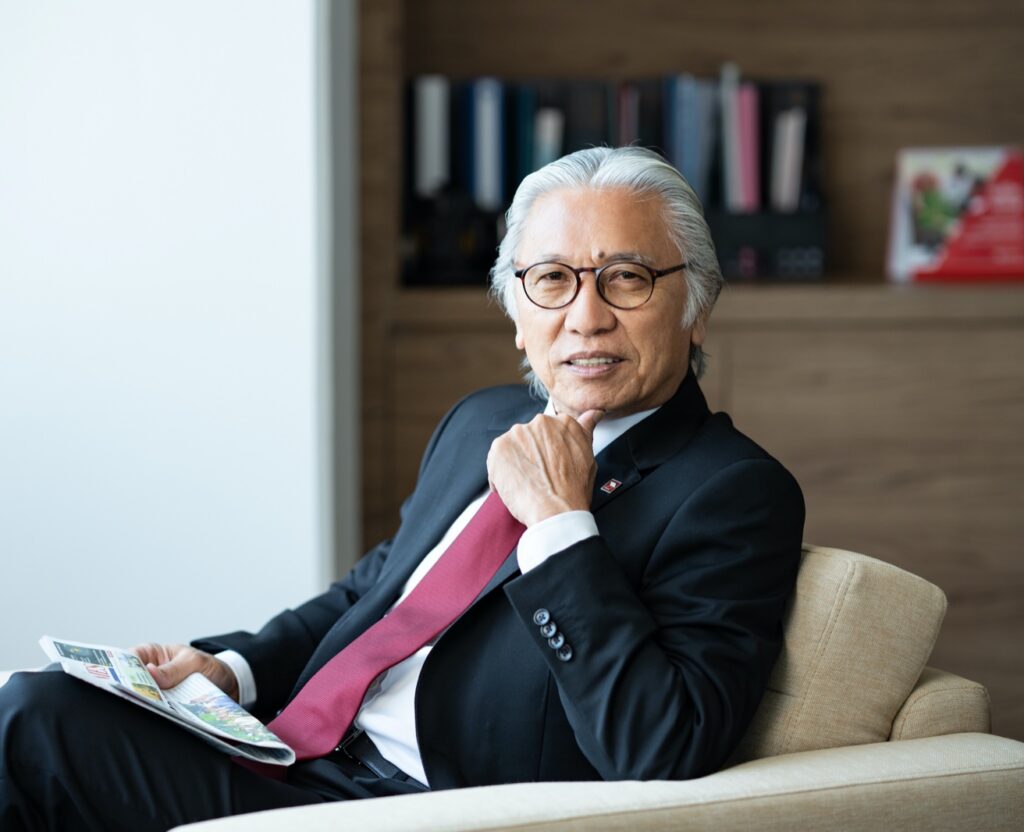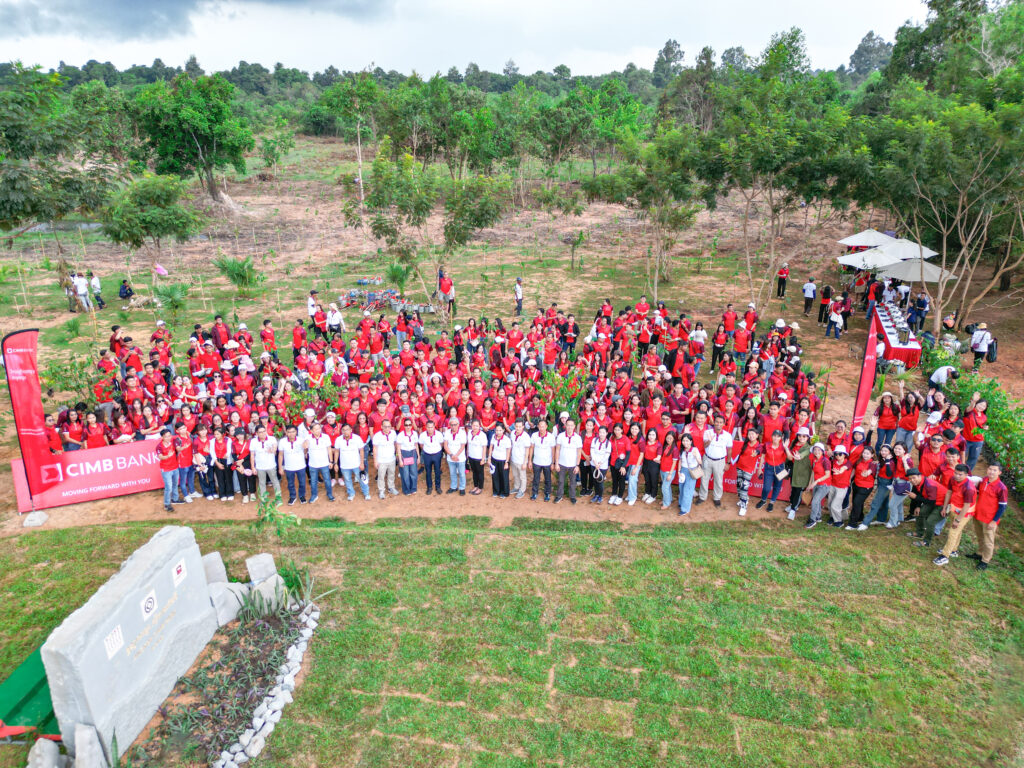A Global Player with Local Expertise
CIMB BANK PLC | BUN YIN – CEO
Combining regional strength with local expertise to deliver tailored financial solutions, CIMB Bank Cambodia is changing the financial landscape of Cambodia.
CIMB Cambodia operates as a fully local subsidiary of Malaysian CIMB Group, emphasizing its commitment to serving the Cambodian market through a team comprised entirely of local staff. This structure allows the bank to navigate the local landscape effectively while leveraging the broader resources of its parent company. “We are proud to be a fully local institution, and our success is built on understanding the unique needs of our community,” says CEO of CIMB Cambodia Bun Yin.

A Strong Regional Network
CIMB Group is the fifth-largest bank in Southeast Asia and a leader in investment banking across the Asia Pacific region. It boasts a vast brand network, with over 600 branches throughout Southeast Asia. As Yin explains, “CIMB Group is a government-linked company in Malaysia, with more than 50% of its shares owned by government institutions and the rest publicly listed.”
CIMB’s global reach extends beyond Southeast Asia, with branches in countries such as the UK, Hong Kong, and Shanghai. However, it is its regional network that gives CIMB Cambodia a competitive edge. “We have the advantage of a regional network, which benefits clients from countries like Indonesia who want to do business here,” Yin shares. This network allows the bank to facilitate cross-border banking, making it easier for clients to open accounts and do business across the region.
Four Pillars of Business
With 14 branches, CIMB Cambodia generates revenue from four key business units: consumer banking, commercial banking, corporate banking, and treasury and markets operations. In consumer banking, the bank offers traditional services such as home loans, car loans, and personal loans, catering to the financial needs of the public. Commercial banking, however, is one of the bank’s most important business units, serving SMEs and supporting trade finance through working capital, overdrafts, and trade funding facilities.
Corporate banking, while not the largest unit in Cambodia, holds a distinct advantage due to the bank’s regional network. “Multinational companies prefer working with us because we have a regional network and can offer support from the group. It gives us a professional edge over local banks,” Yin explains. This advantage allows the bank to attract international clients and maintain a strong presence in the corporate banking sector.
Competitive Edge through Expertise
One of CIMB Cambodia’s primary competitive advantages is its access to a wide pool of regional expertise. Yin acknowledges that while the bank has a robust team of local staff, certain technical areas, such as IT systems, require external support. “We are fortunate to have access to professionals from other countries in our group, like an expert from Vietnam who is currently helping us develop our IT system,” he says. This regional collaboration allows the bank to leverage expertise from across Southeast Asia, enabling it to stay competitive in the local market.
In addition to human resources, CIMB Cambodia benefits from being part of a regional network that adheres to both local and international banking standards. This dual compliance sometimes creates challenges, but it also positions the bank as a reliable and trustworthy financial institution. “We follow strict international standards, and while that may frustrate some customers, it’s necessary for compliance and ensuring we provide the best service,” Yin asserts.
Financial Performance and Challenges
CIMB Cambodia has seen steady financial growth since its inception in 2010. The bank turned its first profit in its fifth year, and by 2022, it had reached peak performance. However, 2023 presented challenges, primarily due to rising interest rates from the Federal Reserve and the post-COVID economic environment. “Our loans began to grow faster than our deposits, which created a challenging situation,” Yin explains. The increased cost of loans, coupled with higher funding costs, impacted the bank’s performance, but the team is already working on recovery. “We’re seeing deposits increase again, and accordingly managing our loans, and ultimately the lending ratio,” he adds.
Despite these setbacks, CIMB Cambodia remains financially solid. The bank’s 2024 budget was set at $20 million, but Yin is optimistic about exceeding that target. “I believe we can reach $24 million, which would be an improvement over last year,” he predicts.
Commitment to Sustainability and CSR
CIMB Cambodia is not just focused on profitability; the bank also places a strong emphasis on sustainability and corporate social responsibility (CSR). So far, the bank has contributed over 600 thousand USD to various CSR initiatives, including projects related to education, healthcare, and environmental sustainability. Furthermore, CIMB has launched its flagship its CIMB ASEAN Scholarship since 2016, of which 3 Cambodian students have been sent to complete their education abroad, including in Canada, Korea, and Australia. “We are committed to giving back to society, and this is reflected in the time and money we invest in our communities,” Yin states.
One of the bank’s most notable 2023 initiatives was its environmental project, which involved planting thousands of trees near Angkor Wat. “We want to support the environment and contribute to attracting more tourism to Cambodia,” Yin says. This was followed in 2024 with the launch of their flagship Angkor CIMB Park, a 5-hectare planting project further strengthening the bank’s commitment to sustainability.
Recently the bank received a prestigious recognition, winning both the “Best Companies to Work for in Asia” and the “Diversity, Equity, and Inclusion Awards 2024” from HR Asia. These honors reflect CIMB’s dedication to cultivating a supportive, inclusive work culture that benefits both employees and the communities it serves.
Looking Ahead
To further boost Cambodia’s growing economy, CIMB Cambodia is always seeking to collaborate with new investors, particularly from the U.S. The bank sees immense opportunities in sectors like education, automotive manufacturing, etc, where companies such as Ford have already made inroads. Indeed, U.S. companies could expand their presence by investing in local production facilities, such as for automotive parts, capitalizing on Cambodia’s strategic position and dollarized economy. “The U.S. is Cambodia’s top export market, nearing $7 billion in just eight months,” explains Yin, emphasizing the vast untapped potential.
In addition to favourable trade conditions, Cambodia’s investment-friendly policies—such as tax holidays and zero VAT—make it an appealing destination for international businesses. “I often liken it to a person in love,” concludes Yin with a smile, underlining Cambodia’s particular attractiveness to investors; “while no one is perfect, every individual has unique qualities that can be appreciated from different angles.”





